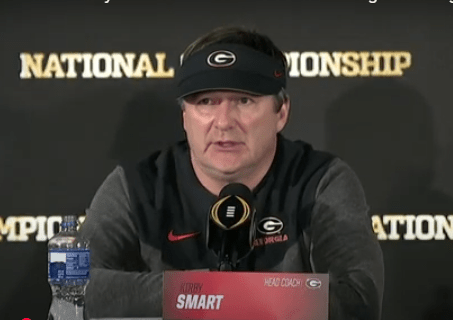The present compensation agreement for Kirby Smart is historic, not merely a news story. With a base salary of $13.2 million and an incredible buyout clause at over $105 million, his contract represents a major shift in the perception of what collegiate athletics are worth. In the last ten years, college football has developed into a lucrative, high-stakes industry where coaches like Smart oversee not only teams but also entire athletic departments, media relationships, alumni fundraising campaigns, and student involvement.

In terms of both yearly compensation and financial security, his 2025 contract puts him ahead of all other NCAA football coaches. It would be extremely difficult for any organization or NFL team to entice him away due to that buyout clause, which was created expressly to stop poaching or early exits. For Georgia, it serves as a statement of intent as well as a defensive tactic. The school has made it clear that Kirby Smart is the way of the future and is making the necessary investments.
Kirby Smart: Bio and Professional Information
| Information Type | Details |
|---|---|
| Full Name | Kirby Paul Smart |
| Birth Date | December 23, 1975 |
| Age | 49 (as of 2025) |
| Current Position | Head Coach, University of Georgia Football Team |
| Annual Salary (2025) | $13,282,580 |
| Maximum Bonus Potential | $1,775,000 |
| Contract Buyout Value | $105,107,583 (if terminated without cause, as of Dec 1, 2025) |
| Conference | Southeastern Conference (SEC) |
| Total Compensation Ranking | No. 1 among NCAA coaches (2025 USA TODAY College Football Survey) |
| Alma Mater | University of Georgia |
| Championships | 2x National Champion (2021, 2022), Multiple SEC Titles |
| Public Salary Data Source |
Smart’s pay system is especially creative since it strikes a mix between performance-based incentives and guaranteed income. In addition to game-day victories, the possibility of earning up to $1.775 million in incentives represents larger institutional objectives, such as meeting academic standards, making it to the postseason, and gaining national recognition. His role is unquestionably more complicated than it has ever been in the age of NIL deals, enlarged playoffs, and conference realignments.
Georgia is now a football superpower thanks to Smart’s savvy recruiting and meticulous game planning. His trajectory has risen significantly since he assumed control in 2016. With consecutive national crowns and regular postseason appearances, he has not only solidified his reputation but also improved the SEC as a whole. This ongoing domination is incredibly successful at holding onto talent and momentum because it is based on a disciplined culture and creative coaching.
It’s critical to comprehend the broader economic framework that enables such compensation. The annual money generated by Georgia football, both directly and indirectly, amounts to hundreds of millions. Attendance at stadiums is constantly at capacity. Media rights, donor money, and merchandise all keep increasing. Even if Smart’s pay is enormous, in this context it turns into an investment with extremely effective returns.
Smart’s pay is very competitive when compared to NFL salary. For example, many NFL head coaches make the same or less money despite having much less job security and frequently tougher media conditions. College football has undergone a significant transformation from an amateur activity to a lucrative enterprise, as seen by the fact that a coach can charge such high prices. It’s no longer shocking to see coaches outperforming their contemporaries in professional leagues as well as university presidents.
The buyout amount, which was $105,107,583 as of December 2025, is especially significant. It demonstrates Georgia’s faith in Smart’s ability to lead going forward. It would be a momentous financial decision in college athletics to terminate his contract without cause. This level of dedication changes the way sports departments plan their long-term tactics, particularly when they are up against other elite universities like Michigan, Alabama, or LSU.
Notes are being taken by other institutions. Nick Saban of Alabama, Dabo Swinney of Clemson, and Marcus Freeman of Notre Dame are among the coaching elite who are currently pushing the boundaries of pay scales. But more than pay, Smart stands out for the way his leadership has changed expectations throughout the college football industry. His ability to consistently bring in five-star players, his flexibility as a coach, and his noticeably better offensive tactics have put him at the forefront of contemporary football innovation.
There is societal relevance to this financial commitment as well. Smart’s pay is controversial in places like Georgia where public financing is closely examined. Critics contend that it highlights public education’s misaligned goals. However, supporters argue that the success of his program has raised the university’s national stature, alumni donations, and enrollment interest. Accordingly, Smart’s profits represent the output of a full economic engine rather than just personal pay.
The ability of Smart to continue to succeed in a fast changing environment will be put to the test in the future. He needs to be more than just a tactician because of the NCAA’s player pay rules and the mounting pressure from conference realignment. He is now simultaneously a CEO, marketer, educator, and recruiter. His coaching tree, which is already growing, gives a glimpse of the legacy Saban once left behind. Smart’s assistants are starting to take on important positions, continuing a trend of influence that is especially advantageous to the SEC’s sustained supremacy.
Interestingly, Smart has thrived in the face of extreme pressure. His calm manner and measured risk-taking have become hallmarks in a sport where a single defeat may cause panic. Instead of being viewed as excessive, his contract serves as a model for keeping top coaching talent in a market with a high demand and a low supply.
